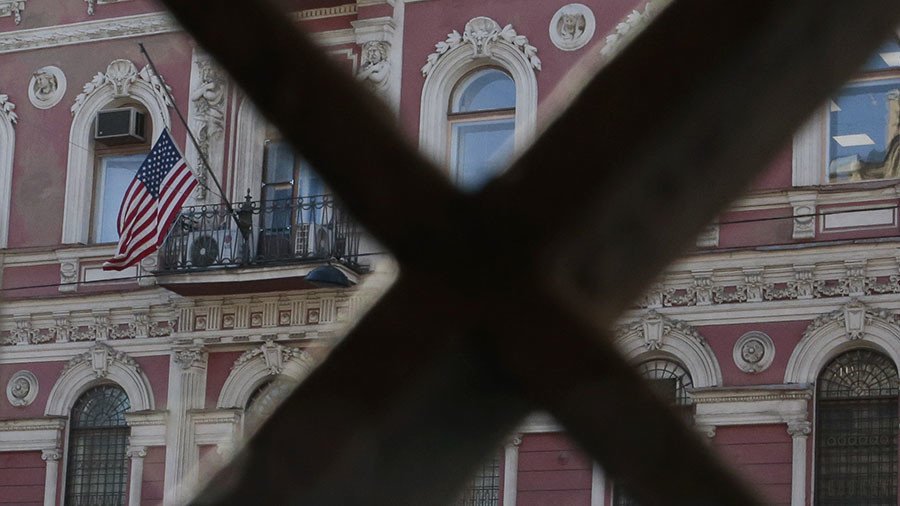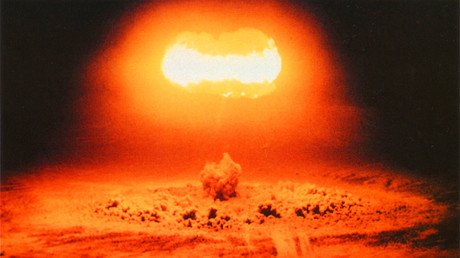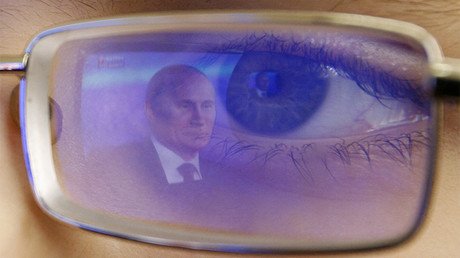Escalation in West-Russia tension is frightening & dangerous – former diplomats

What is most alarming, both in terms of the politicians and spokespeople on both sides, is that nobody seems to understand the danger of this steady escalation between the US and Russia, former US diplomat John Graham told RT.
Russia will expel 60 US diplomats and close the US Consulate in St. Petersburg in response to similar actions by Washington over the Skripal poisoning case. Russian Foreign Minister Sergey Lavrov announced the retaliatory measures against the US and pledged a "mirror response" to other states that have kicked out Moscow's diplomats.
However, the diplomatic standoff threatens to continue escalating, as Washington says it may respond further to Moscow's moves.
RT asked former US diplomat John Graham how these measures will affect relations between Washington and Moscow and the processing of visas to Russian citizens wanting to visit the US.
"I live near Seattle and I particularly am not being hurt. The next time I have to go to Russia I can get a visa someplace else," he said.
But what is important to understand is the reality behind all the smokescreens, Graham pointed out.
In his opinion, "it is almost certainty that so-called diplomats on both sides were in fact spies" as "that is what nations do."
"Russia has spies, in this country, we have spies in their country, I suspect people from Malawi have spies in this country… It is just part of statecraft," he said. And the first thing you do when you are going tit-for-tat, is you should throw the other fellow's spies out."
The second thing, he continued, is about the 'whodunit' aspect of the former double agent poisoning in Salisbury, England.
"I looked at a formula of Novichok nerve agent; it is very unstable, it is very dangerous stuff to handle, you have to be an expert to handle it or you will kill yourself. The question is, why on Earth – if you want to assassinate Mr. Skripal and his daughter – you would use such a dangerous weapon. He is sitting on a park bench, why not just walk up behind him and shoot him in the back of the head? I've come to the conclusion that basically the nerve agent was used because the person that did it knew it would be traced back to the Kremlin. Because this stuff actually was invented, made, and weaponized originally by the Russians. I don't care what the OPCW, that international organization, says in two weeks… The stuff was Novichok, but that doesn't mean Russians did it," he told RT.
Graham does not rule out that "it was some false flag operation by someone who just wanted to increase the chaos between the US and Russia."
The US State Department was quick to react to Moscow's decision to expel 60 American diplomats, saying they "reserve the right to respond."
Graham said that this escalation between Russia and the US could go on and on and warned about the danger of the situation.
"We have one more consulate in Russia, we have one more consulate here [in Houston]. We can close that. We can send your ambassador home, persona non grata. You could close our remaining consulate in Yekaterinburg. And you could declare our ambassador persona non grata. And it goes on and on," he said.
"What I find most alarming – both in terms of the politicians and spokespeople on both sides, and the whole lot of the media – is that nobody seems to understand the danger of these steady escalations. And that is the real danger," Graham said.
Expulsion of Russian diplomats 'a sign of how close to the brink of a major war the world is coming' (Op-Ed by @JimJatras) https://t.co/SwI1HWd7Dn
— RT (@RT_com) 27 марта 2018 г.
Meanwhile, the diplomatic standoff between Moscow and Western countries can also affect Russia's relations with Canada, according to Jeremy Kinsman – former Canadian ambassador to Russia, Canadian high commissioner to the United Kingdom (2000–2002), and Canadian ambassador to the European Union (2002–2006).
Earlier in the week, Canada said it would expel four Russian diplomats "in solidarity with the UK." That means that Russia will tell four Canadian diplomats to leave its soil.
"Russian relationships with Canada are very deteriorated and this is not going to help them. On the features of having deteriorated relations is that embassies have much less to do. Bouncing four people either way isn't going to make a lot of difference as far as activities are concerned. But it is a deplorable situation. And people have to get their heads together and work out the rules of the game so something like this never happens again," Kinsman said.
Commenting on the entire situation, he noted that the expulsion of diplomats is not the most dangerous thing – but the absence of communication is.
"There's got to be communication to work things out. Not just on this but on a very complicated world, on increasing distrust, particularly on the part of Western politicians," he said.
Kinsman underlined that "the competitive rhetoric and threats" between Russia and Western countries have to stop.
"It's becoming not just childish, but really very frightening," he added.














